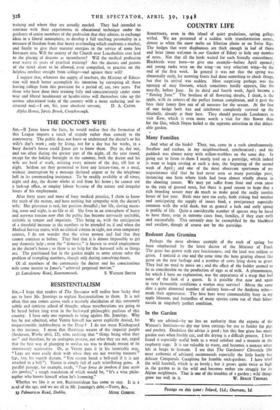RESISTENTIALISM
Stir,—I hope that readers of The Spectator will realise how lucky they are to have Mr. Jennings to explain Resistentialism to them. It is not often that one comes across such a masterly elucidation of this extremely subtle and intricate school of thought, whose reverberations are going to be heard before long even in the backward philosophic purlieus of this country. I have only one reproach to bring against Mr. Jennings. Why has he not admitted, what Ventre himself has never explicitly denied, his unquestionable indebtedness to the Dane ? I do not mean Kierkegaard in this instance. I mean that illustrious wearer of the imperial purple (Andersen, Werke xlvii, 12), who, realising that "things being what they are" and therefore, by an analogous process, not what they are not urged that the best way of plunging in medtas res was to denude reason of its unnecessary accessories. Or, as Ventre puts it in his inimitable way, "Legs are most easily dealt with when they are not wearing trousers" (cp., too, his superb dictum, "You cannot break a bell-pull if it is not attached to a bell "). Ventre is simply full of such scintillating gems. A parallel passage, for example, reads, "Pour force de jambon ii faut avoir ties jambes," a rough translation of which would be, "It's a wise philo- sopher who knows himself when he's hamming."
Whether we like it or not, Resistentialism has come to stay. It is a aced- of the age, and we are all in Mr. Jennings's debt.—Yours, &c.,






























 Previous page
Previous page